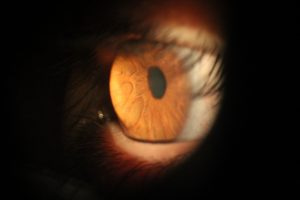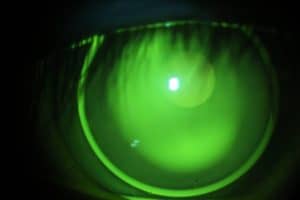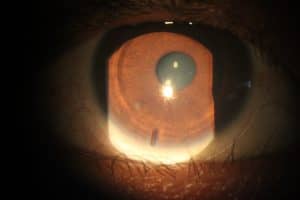Services
Scleral Contact Lens and Kerasoft IC Fitting

 What is Keratoconus?
What is Keratoconus?
Keratoconus is a condition where the outer ocular surface (cornea) becomes progressively thinner and eventually becomes cone-shaped. A person who has keratoconus will have poor vision due to the increase in nearsightedness and irregular astigmatism.
Patients often have a history of allergies and eye rubbing while growing up. Keratoconus is usually diagnosed during late teens to early 20’s, however, cases of keratoconus in kids are also seen.
How to improve the vision of the patient with keratoconus?
For very mild cases, wearing eyeglasses and soft contact lenses with astigmatism can improve the vision. But when the condition progresses and the irregularity of the corneal surface increases, the lens of choice will be gas permeable lenses (RGP), Kerasoft IC soft lenses and scleral contact lenses.

Gas Permeable Contact Lenses
The size of gas permeable lenses are between 8 to 11mm. How gas permeable lens work is that it acts as the new smooth surface of the eye, and thus allow the light entering the eye to focus better, and so allowing patients to see better.
These lenses are indicated for mild to moderate cases of keratoconus.

Kerasoft IC
Kerasoft IC lenses on the other hand are customized soft contact lenses indicated for patients with mild to moderate conditions stated above. It brings convenience to patients who desire to have a more straightforward contact lens regimen.

Scleral Contact Lens
Scleral contact lenses can be as big as soft contact lenses and sometimes even bigger depending on the condition that has to be managed. It is truly an important tool for optometrists to use especially on keratoconus patients as corneal transplant can be delayed because these lenses can provide good to great vision even in those patients with severe or advanced conditions. Scleral lenses are also being used to manage patients with dry eyes. Because the bowl can be filled with liquid, it protects the cornea and moisturises it. Scleral lenses are truly life changers for patients, from not being able to see well enough to have a job to being able to find a job and excel on it.
Other Indications for Specialty Contact Lenses

- Keratoconus
- Post-corneal transplant
- Pellucid Marginal Degeneration
- Post Refractive Surgery Enhancement
- Post ocular trauma
- Sjogren’s Syndrome
- Stevens-Johnson Syndrome
- Fuch’s Dystrophy
- Corneal Scars
Some of these conditions can bring about astigmatism that can be addressed by using specialty contact lenses such as RGP, scleral lenses and customized soft contact lenses (KerasoftIC). While some may benefit from the tear reservoir found in scleral contact lens wear.


